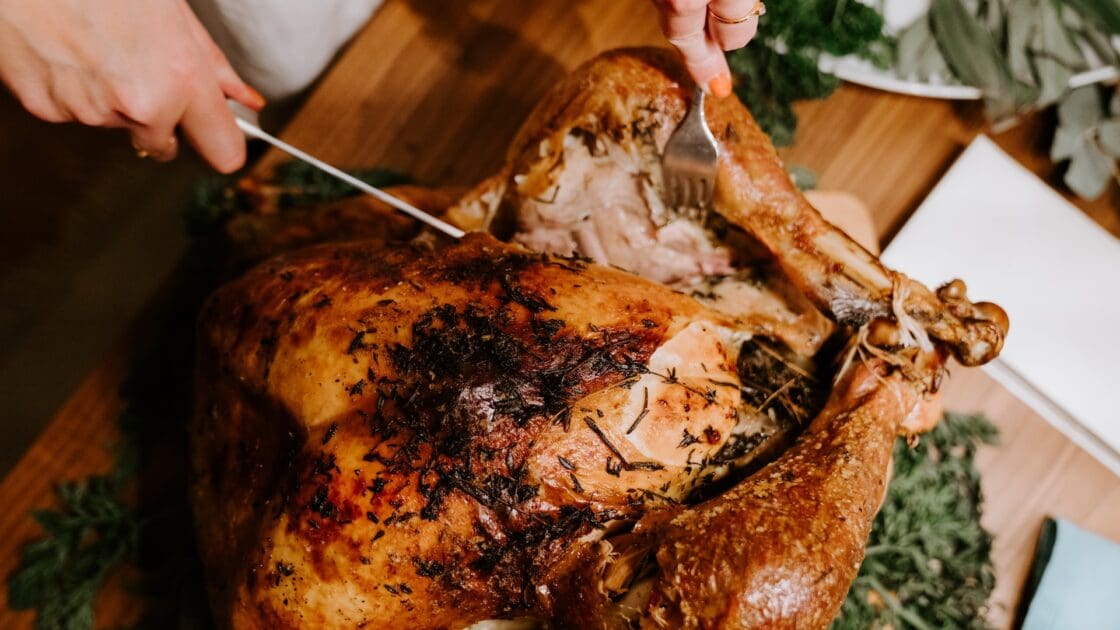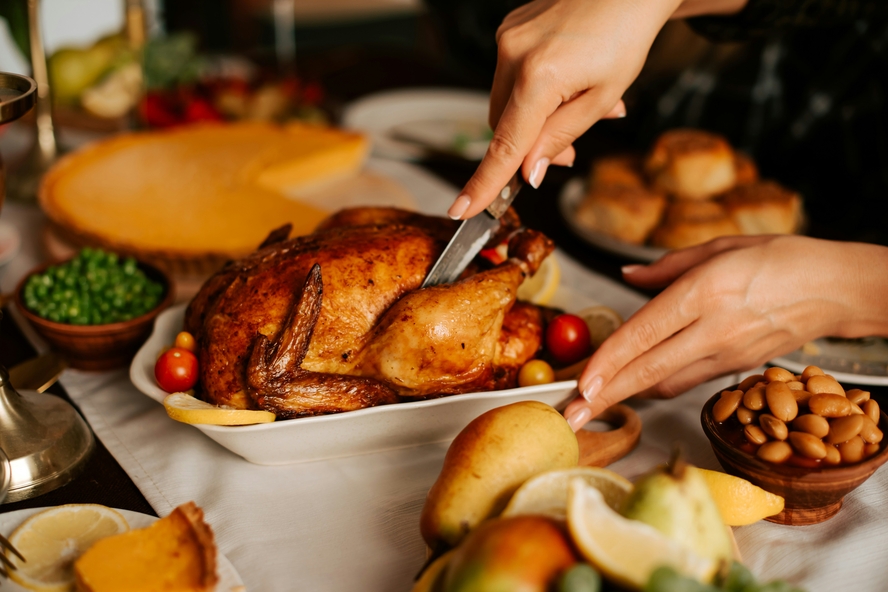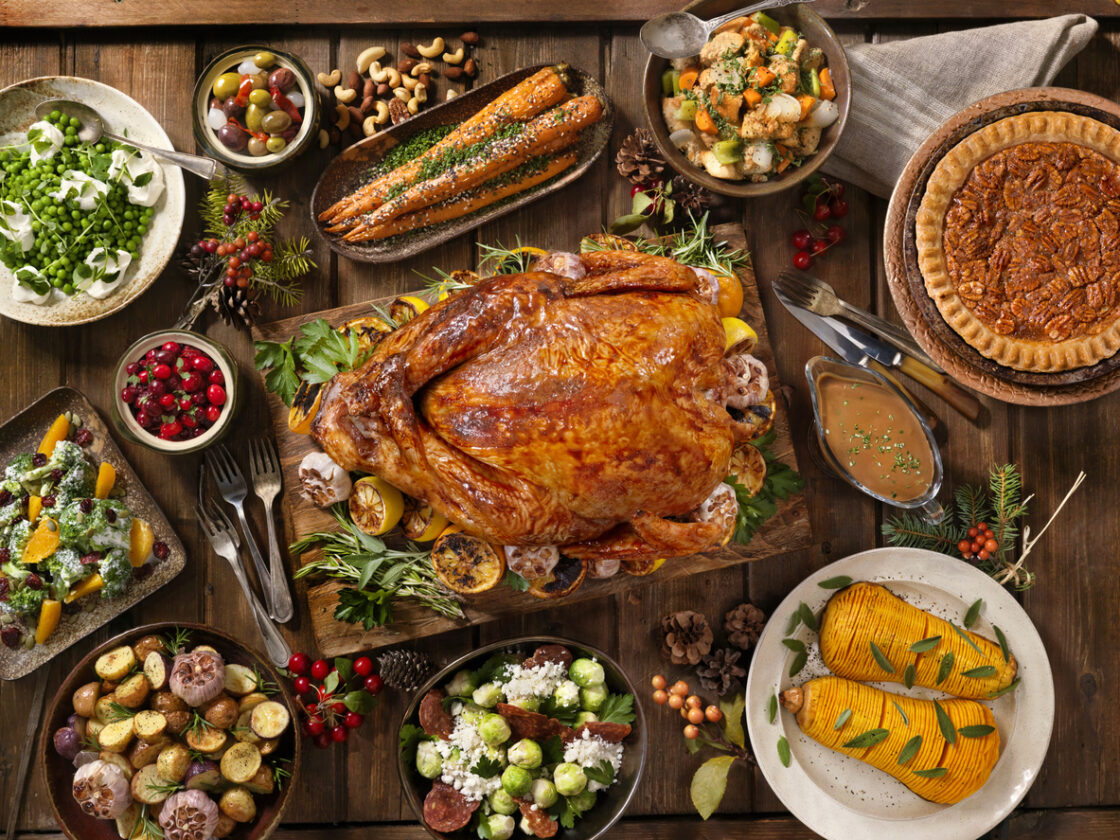Heritage Turkey: Is It Worth It? 5 Reasons It’s Better Than Conventional Turkey
A heritage turkey may be pricier than a supermarket turkey, but it’s a tastier, healthier, and a much more sustainable option.

In 1874, the American Poultry Association recognized seven varieties of heritage turkey as the “Standard of Perfection” — the official guide to breed standards for poultry. Despite this recognition, traditional heritage birds were eventually eclipsed by tender, milder, big-breasted breeds in the 20th century.
In fact, the Thanksgiving turkey you’re used to eating probably isn’t a heritage turkey. The big-breasted breeds became so standard that NBC News went as far as to say heritage turkeys were on “the brink of extinction in the United States”1. The outlet reports that as of 2001, there were only about a dozen Narragansett turkeys in the country.
Today, things are looking up. Thanks to a few dedicated farms focusing on heritage turkey breeds, there are now over 15,000 heritage turkeys nationwide. That’s still a small number compared to the roughly 218 million commercially bred turkeys, but it’s a good start2.
Compared to the industrially produced Broad Breasted White turkey, it can be a bit trickier to find a heritage turkey for Thanksgiving (not to mention pricier!). But before you give up the search, it’s important to understand the benefits. Here at Organic Authority, we love making an informed decision for our health and our planet. From opting for non-toxic cookware and bakeware to researching the best greens powder options, we’re all about sharing the facts you need. Let’s cover the differences and benefits to answer one simple question: Is a heritage turkey worth it?
What Is a Heritage Turkey?

The Livestock Conservancy uses three key criteria to define a heritage turkey.
First, a heritage turkey must be able to mate naturally. If you’re thinking, duh, all turkeys should be able to reproduce on their own, think again — thanks to commercial breeding, today’s Broad Breasted turkey’s massive breast size and tiny legs make it physically impossible for them to mate on their own. Instead, mass-produced turkeys can generally only reproduce through artificial insemination.
Second, they should have a long outdoor lifespan. In other words, they should be able to survive outside in their natural environment for a typical length of time (roughly 3-5 years for males and 5-7 years for females). Commercially produced turkeys are typically not bred to survive an outdoor environment, making them more fragile and prone to disease.
Finally, a heritage turkey must show a slow to moderate growth rate. To put this in perspective, heritage turkeys reach a marketable weight in about 28 weeks, which gives them enough time to develop strong bones and organs before putting on muscle mass. Mass-produced turkeys, on the other hand, are bred to produce meat as quickly as possible. They’re typically slaughtered at 14 to 18 weeks, roughly half the time it takes a heritage turkey to naturally develop.
Knowing these key distinctions, I bet you can start to get an idea of why someone might choose a heritage turkey this year. But let’s break it down a bit.
The Benefits of Choosing a Heritage Turkey for Thanksgiving

There are a few staple dishes we associate with a typical Thanksgiving dinner. For our sides, we love these classic mac and cheese recipes and some jazzed-up mashed potatoes. We also like adding a casserole in the mix, whether it’s this vegan green bean version or a gluten-free sweet potato casserole. And of course, you can’t forget the cranberry sauce and the homemade pumpkin pie.
However, there’s one dish that screams Thanksgiving more than anything else, and that’s turkey. Of course, if you really want to go for a vegetarian Thanksgiving, there are plenty of more sustainable alternatives to turkey. But if you’re not ready to let go of tradition just yet, we understand — you can still take a healthier, more environmentally friendly stand by opting for a heritage turkey.
Here are the 5 reasons why a heritage turkey might be a better choice for you and your family this year.
1. Heritage turkeys are more traditional.
Seeing as Thanksgiving is all about tradition, authenticity seems like a good reason to opt for a heritage turkey.
While our forefathers certainly hunted their own wild birds (or, let’s be honest, relied on the Wampanoag to source them…3), farm-raised heritage turkeys are an excellent compromise. The Heritage Turkey Foundation recognizes ten specific heritage turkey breeds, including Narragansett, White Holland, Jersey Buff, and Bourbon Red.
Heirloom birds, while similar, are not quite the same thing as heritage turkeys. Think of heirloom turkeys as a middle ground: They combine elements of both heritage turkey and modern breeds. The result is a superior yield in meat compared to true heritage turkey, while still retaining an element of the rich flavor that heritage turkey lovers crave.
Of course, you need to do your research to make sure you know what you’re getting. Because there is no official certification program for the labeling of either heirloom or heritage turkeys, the words can often be thrown around willy-nilly.
“I have seen people think they have heritage birds because they have dark feathers,” says Frank Reese, a heritage turkey farmer in Kansas. “But the color of the feathers don’t mean a thing.”
Ask questions of your farmer or vendor to make sure that you’re getting the more traditional and natural heritage bird that you’re looking for.
2. Heritage turkeys are more sustainable and more humane.
By definition, Heritage turkeys are bred much more naturally than mass-produced turkeys. While our reminder to do your own research still applies, a heritage turkey is an overall more sustainable choice than a supermarket turkey.
Choosing a sustainably raised bird for Thanksgiving means supporting farming practices that are respectful to the animals and the land, and which ultimately result in a wholesome and healthy turkey.
Heidi Diestel, Diestel Family Ranch

As we mentioned earlier, heritage turkeys tend to be slaughtered much later than commercially bred turkeys. While this is one contributing factor in their higher price point, the other is that most farmers who opt to raise heritage turkeys also choose to incorporate other sustainable practices into their work.
“Choosing a sustainably raised bird for Thanksgiving means supporting farming practices that are respectful to the animals and the land, and which ultimately result in a wholesome and healthy turkey,” explains Heidi Diestel, organic heirloom turkey farmer at Diestel Family Turkey Ranch. “Our thoughtfully raised birds grow slowly and naturally, with plenty of fresh air and room to roam, whether indoors or outdoors.”
That said, keep in mind that the terms “heritage” and “heirloom” turkey only refer to a breed. If you want to be certain that a farmer uses sustainable practices, you might also want to opt for additional labels, like the Global Animal Partnership certification that Diestel Family Ranch has earned. You can also find turkeys with antibiotic-free, vegetarian-fed, certified organic, Non-GMO Project Verified, and pasture-raised labels.
3. Heritage turkey is tastier.
Trying an heirloom or heritage turkey for the first time may be a bit surprising, because it will actually taste like something — a bit gamier and richer than most supermarket birds. This stronger flavor stems from both the heritage breeds themselves and the age of the bird at slaughter. The latter can also make these birds a bit more textured than the turkey you may be used to.
In a Bon Appétit blind taste test, three out of four tasters preferred the heritage turkey taste and found it more flavorful than conventional turkey4. However, one thing to note in your decision is that the testers also found heritage turkey slightly drier. To make sure your final dish is moist, most experts recommend brining your turkey (read our guide on the Pros and Cons of Brining a Turkey). Others suggest roasting the breast and dark meat separately to ensure ideal flavor and texture in both portions of the bird.
4. Heritage turkey is healthier.
You might have already guessed this, but heritage and heirloom turkeys also tend to be healthier than conventional turkeys — not because of any true differences in nutritional content between the breeds, but rather because of the way that they are raised.
For example, Diestel notes that her birds, which are fed a vegetarian diet and given enough space to roam and remain healthy, do not need to be treated with antibiotics as so many conventional birds do.
These more natural techniques aren’t just better for the health of those around your table — they also prevent the development of antibiotic-resistant superbugs (meaning they’re healthier for literally the whole population).
These methods are also much healthier for the people who work with the turkeys. Confined animal feeding operations (like the ones associated with mass poultry production) deal with high emissions of ammonia from animal waste, which can impact the health of the turkeys and the workers who deal with them. As if that weren’t bad enough, these operations are also the main source of greenhouse gases5.
Finally, heritage and heirloom birds generally contain no additives, whereas conventional birds are often injected with a solution of water, salt, and other flavorings before being sold.
5. It’s a better conversation piece than family drama.
Holidays are always filled with uncomfortable questions about ex-boyfriends, alternative new haircuts, and five-year plans. What better way to change the subject than to say, “Hey, Great-Aunt Margie, what do you think of this heritage turkey?”
Read more on Organic Authority

Sources:
- https://www.nbcnews.com/business/consumer/heritage-turkey-making-comeback-delighting-slow-food-fans-families-n686821
- https://www.statista.com/statistics/196092/total-number-of-turkeys-raised-in-the-us-since-1999/
- https://www.washingtonpost.com/history/2021/11/04/thanksgiving-anniversary-wampanoag-indians-pilgrims
- https://www.bonappetit.com/test-kitchen/cooking-tips/article/does-heritage-turkey-taste-better-than-conventional-in-a-blind-taste-test
- https://www.sciencedirect.com/science/article/abs/pii/S0301479722024926

